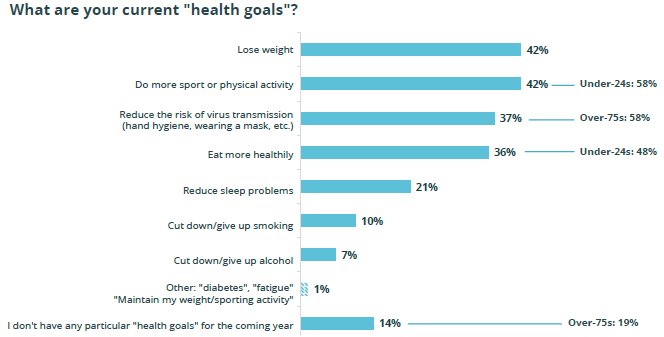
French people are in good health... and intend to stay that way! This is reassuring news. According to our study conducted with Argus de l'Assurance, 89% of French people say they are in good health. This percentage even rises to 95% for the under-24s. So what are the French people's health objectives? How important is prevention to them?
The health objectives
Although the vast majority of people consider themselves to be in good health, it is also important to note that many people are concerned about their state of health. 86% of them say they have at least one health objective:

So are people healthy? Yes, but they also want to stay that way! These health goals differ according to age and life environments: young people are more committed to maintaining their well-being and are inclined to engage in sports activity, while older French people say they are more concerned about viruses and want to protect themselves and others. This trend can undoubtedly be explained by the consequences of the pandemic. However, the trend is a reality and has an impact on the use of remote consultations (which has grown three-fold in one year) and the uptake of connected devices, despite their sometimes prohibitive prices.
French people interested in prevention services
According to this market research, a very large proportion of French people surveyed (80%) said they were interested in the prevention services available on the market.
At the top of the list is alternative medicine (acupuncture, sophrology, physiotherapy), followed by support services during a hospital stay, advice on how to improve sleep, monitoring services for chronic illnesses, sports or nutritional coaching and lastly support services for well-being at work. The downside is that many French people still don't know about these prevention services (suggested awareness of them is a maximum 50% of respondents and fluctuates around 30% on average for the dif- ferent services) despite their obvious potential.
What is the challenge for insurers?
So where are insurers in all this? Once again, French people's position on the subject is quite clear: they feel they need to be accompanied. According to the market research, 61% of French people covered by a supplementary insurer expect it to offer them preventive services adapted to their needs. This is a relatively high figure, especially as it is deceptive. Indeed, it is somewhat "driven down" by the 16% of French people who say they don't have any health goals, with just 31% expecting their insurer to offer such services. These figures raise questions and should prompt insurers to rethink their role in the field of prevention.
If you are interested in this topic, the Cegedim Insurance Solutions team is at your disposal to answer to all your questions.





